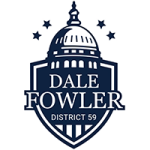Lawmakers returned to Springfield last week, gathering on Feb. 20 for a joint session of the General Assembly to listen as Illinois’ new Governor outlined his spending plan for the coming year.
The Governor’s proposed budget represents a starting point for further negotiations; however, there are concerns about references to more spending, more tax increases and budgeting gimmicks that tried and failed in the past. Although lawmakers will have time to analyze the fiscal details, many have already expressed their concerns about proposals to address the pension system, the Governor’s calls for a graduated income tax and other revenues from such actions as legalizing medical marijuana and extending Illinois’ pension payments.
“While I can recognize the efforts of the new administration to hit the ground running, I have serious concerns about the how the governor’s proposed budget will impact Southern Illinois. Broad and unrealistic proposals, such as a shortsighted minimum wage increase, a costly progressive income tax system or Band-Aid fixes for Illinois’ ballooning pension crisis, will have lasting detrimental consequences on the region,” said Senator Fowler. “In his inaugural address earlier this year, Governor Pritzker vowed to do more for Southern Illinois, and I was encouraged to hear him reiterate that commitment in his address. Hopefully he will put action behind his words and from here we can move forward in a bipartisan manner that will help Southern Illinois and tackle the very real issues facing our state.”
As the legislative budget process gets under way, lawmakers should instead work together in a bipartisan way to make the tough decisions necessary to pass a balanced budget with structural reforms that will boost the economy and create jobs.
Fiscal Year 2020 runs from July 1, 2019, through June 30, 2020.
In other news, less than a week after Democrat legislative leaders forced through a minimum wage hike, Gov. Pritzker signed Senate Bill 1 into law on Feb. 19. The controversial legislation was advanced by the Senate and House on party-line votes, despite economic concerns from employers and public groups.
The plan would raise the minimum wage to $15 per hour over six years, and to $13 per hour during the same period for those employees younger than 18.
Opponents of the plan noted the vast differences in the cost of living across Illinois. They also raised concerns that the incremental increase could have far-reaching implications for employers across the board, including an increase in annual costs for state agencies, local school districts, human service providers and hospitals.
During the hustle-and-bustle of budget address week, members of the Graduate and Professional Student Council from SIU-C made the trip up to Springfield. Senator Fowler welcomed them on the Senate floor for a visit on Feb. 20.
Senator Fowler will be hosting another mobile office event for area constituents, this time in Vienna. From 12-2 p.m. on March 4, residents are encouraged to come out to the Vienna City Hall and speak with Senator Fowler and District staff. This is a great opportunity to ask questions, voice concerns and let the Senator know what’s happening in the community. Questions about the event can be directed to Senator Fowler’s District office at 618-294-8951.
State News
Greater protections from ethylene oxide
A package of legislation unveiled Feb. 19 will address the public health crisis caused by Sterigenics and their release of ethylene oxide into surrounding communities.
The Illinois Environmental Protection Agency issued a seal order Feb. 15 against Sterigenics, which forced them to cease operations. The legislation will also ensure the proper policies and protections are in place to safeguard Willowbrook and all Illinois communities from the impact of this public health hazard.
Senate Bill 1852 requires:
A facility to notify all affected property owners and local governments within 2,500 feet when an ethylene oxide leak has occurred.
Senate Bill 1853 provides that:
The IEPA shall reevaluate the current CAAPP (Clean Air Act Permit Program) permit of any facility emitting ethylene oxide, and conduct a 90-day public hearing process on such permits.
No permit shall be renewed if the facility is in violation of any federal or state standards or current studies pertaining to ethylene oxide.
A facility emitting ethylene oxide at levels higher than federal or state standards must cease operations until the level of emissions are reduced below the federal and state standards.
Senate Bill 1854 provides that:
No facility shall have fugitive emissions of ethylene oxide above zero.
Each facility is subject to regular and frequent inspections and testing to ensure that no fugitive emissions of ethylene oxide exist. Inspections shall be unannounced and conducted by a third party chosen by the municipality in which the facility operates.
Each facility is subject to fence line ambient air testing, at random, once within every 90-120 days for a duration of 24-hour samples of no less than six consecutive days. Testing is done by a third party chosen by the municipality.
Protecting Mahomet Aquifer
Also during the week, a legislative package was introduced to protect the Mahomet Aquifer, the primary water source for Central Illinois.
The package of bills is supported by a bicameral and bipartisan group of Senators and Representatives who are working to pass them into law, based on recommendations from the final report of Mahomet Aquifer Task Force.
Senate Bill 2073 creates a permanent body, the Mahomet Aquifer Council, to serve as a watchdog and to provide oversight for the Mahomet Aquifer.
Senate Bill 2071 would provide $1 million in funding for equipment for the University of Illinois’ Prairie Research Institute (PRI) so that the organization can continue to research and study the aquifer.
Senate Bill 2072 would provide $2.3 million in funding for ongoing PRI operations.
Senate Bill 2070 would appropriate $4 million for the utilization of helicopter-based time-domain electromagnetics technology for the purpose of mapping and studying of an area of the aquifer known as Zone 2. This zone is where a recent leak of natural gas occurred.
Senate Bill 2074 would allow State Treasurer to accept restitution payment from Peoples Gas, if a court finds the company liable for a recent leak of natural gas into the aquifer.

